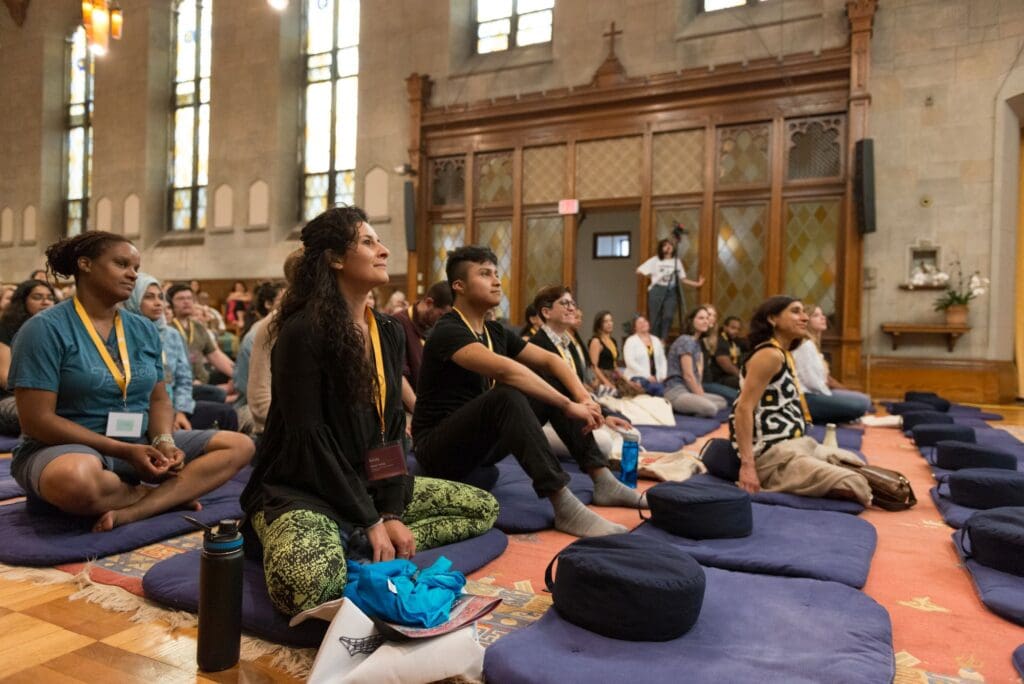
Lao Tzu famously said, “A journey of a thousand miles begins with a single step.” Four years ago, we took that step at Mind & Life with a commitment to engage in anti-racist practices. It has been a humbling journey of deep reflection and meaningful transformation, along with missteps along the way. Today, I am pleased with what we’ve learned and accomplished, while recognizing this is an unfolding process with no discrete end.
I share with you now questions that we have wrestled with, along with practices we’ve adopted, that have resulted in real and lasting change. This is a simple reflection rather than a report card.
- How do we manage deep-level change from the inside out? Time and again in this process, we’ve come to recognize you don’t know what you don’t know. Carving out a leadership position to spearhead our diversity and inclusion efforts, for example, fell short of engaging our entire organization in a deep process of self-reflection, and embedding the principles of equity, diversity, and inclusion (EDI) throughout our work. Toward that end, EDI priorities are now integrated within every team members’ performance goals, an internal EDI Working Group informs our efforts, and a Journal Club engages staff in thoughtful reading and discussion.
Just last month, 11 members of our staff leadership, Board of Directors, and Steering Council completed a yearlong Mindful of Race leadership training with Ruth King. The experience was transformative, inviting us to look deeply at our understanding of race and our own racial histories through affinity groups. While each participant took away something different, we all recognized the need to listen more deeply, to engage more diverse voices and perspectives, and to be aware of how power and privilege show up in our everyday lives and leadership roles. - What are the systems and structures that need to shift? Where can we have the greatest influence in the short term? Historically, contemplative research has been dominated by a largely racially and ethnically homogenous group of scientists, scholars, and practitioners, most of them men. With time, women have played an increasing role in the field of contemplative science, and hence our work, yet we still have a long way to go to engage and support BIPOC (Black, Indigenous, People of Color) individuals in pursuing contemplative research that is truly reflective of and responsive to the times in which we live.
Our efforts to conceive a new, more inclusive chapter of Mind & Life’s story include the development of a new Mentoring and Leadership Program. In the short term, we seek to support and grow the pool of historically underrepresented investigators in contemplative research who seek funding from Mind & Life. A nine-person, BIPOC committee, led by contemplative inclusivity consultant Kamilah Majied, is guiding this process and we are on pace to launch the pilot program in 2022. Through co-created mentor-mentee relationships, we seek to cultivate mentees’ capacities to lead change within their institutions, professional organizations, communities, and Mind & Life itself. - How do we truly live our mission and values? What’s getting in the way? At the heart of Mind & Life’s mission is bridging science and wisdom traditions to reveal insights that can foster interconnection, inspiring the cooperative action needed to tackle our world’s most pressing challenges. Upholding EDI principles is core to everything we believe; yet we continue to identify and work on our blind spots. Staff now regularly lead organization-wide discussions on the characteristics of white supremacy culture, thereby facilitating open and honest dialogue around themes like perfectionism and urgency and their antidotes.
Among our core values is a commitment to excellence; yet we continue to grapple with how to reach our highest potential while examining the processes by which we do so. Creativity requires messiness; excellence doesn’t always mean rigor. We continue to strive for intellectual humility and the pursuit of different ways of knowing through uplifting diverse disciplines and perspectives. - How do we build upon our strengths? At Mind & Life we are blessed with an expansive community of leading-edge thinkers and doers. Our sweet spot is sparking dialogue and community-building at the intersection of science, contemplative wisdom, and action.
I’m especially moved by how over the past couple of years we have highlighted diverse voices in our programs and digital offerings. From Indigenous scholar Kyle Whyte, a speaker at our 2021 Summer Research Institute, we learned that the origins of climate change can be traced to “a breakdown in kinship relationships”—the moral bond between people, plants, animals, and habitats. From mindfulness teacher and law scholar Rhonda Magee, a guest on our Inspiring Minds series and Mind & Life podcast, we learned how mindfulness and compassionate action can support us in using our power rightly to combat injustice. And in another podcast interview, social psychologist Buju Dasgupta shared how implicit gender bias shakes the confidence of women and students of color pursuing degrees in engineering and science, and steps to counteract this. These presentations and discussions (most of which can be accessed freely on our website) speak powerfully and authentically to the injustices and pain of our times—informing and inspiring millions.
Four years after embarking on this journey, our work looks and feels different. All of our events begin with a Land and Peoples Acknowledgement. In addition, we regularly provide closed captioning and written transcripts to ensure that people who are hearing impaired can benefit from our video and audio content. Following a staff workshop on gender identity and sexual orientation, our email signatures and digital platforms include personal pronouns. And we’ve created a more explicitly inclusive orientation process for those providing service to Mind & Life, such as grant reviewers and program planning committees.
Over a third of our 2020 event participants and grantees identified
as Black, Indigenous, or People of Color (BIPOC).
We also introduced changes in our grantmaking policies and event guidelines to increase the diversity of our grantees, program planning committees, and event presenters and participants. As a result, over a third of our 2020 event participants and grantees identified as BIPOC. This year, we also increased accessibility to our programs by offering a record number of scholarships to participants at our 2021 Summer Research Institute (SRI), along with “access for all” to recordings of our Science & Wisdom of Emotions Summit.
As this journey unfolds, we continue to respond thoughtfully to challenges and identify areas for growth. I’m grateful to all of our staff, board, committee members, and extended community for showing up fully as we navigate a sometimes rocky path to truly living our vision of a world that embraces our shared humanity.


